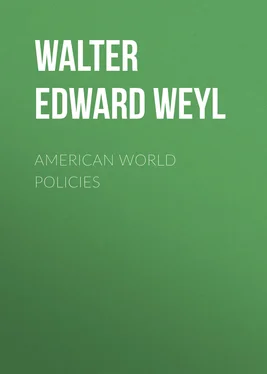Walter Edward Weyl - American World Policies
Здесь есть возможность читать онлайн «Walter Edward Weyl - American World Policies» — ознакомительный отрывок электронной книги совершенно бесплатно, а после прочтения отрывка купить полную версию. В некоторых случаях можно слушать аудио, скачать через торрент в формате fb2 и присутствует краткое содержание. Жанр: foreign_antique, Политика, Юриспруденция, на английском языке. Описание произведения, (предисловие) а так же отзывы посетителей доступны на портале библиотеки ЛибКат.
- Название:American World Policies
- Автор:
- Жанр:
- Год:неизвестен
- ISBN:нет данных
- Рейтинг книги:5 / 5. Голосов: 1
-
Избранное:Добавить в избранное
- Отзывы:
-
Ваша оценка:
- 100
- 1
- 2
- 3
- 4
- 5
American World Policies: краткое содержание, описание и аннотация
Предлагаем к чтению аннотацию, описание, краткое содержание или предисловие (зависит от того, что написал сам автор книги «American World Policies»). Если вы не нашли необходимую информацию о книге — напишите в комментариях, мы постараемся отыскать её.
American World Policies — читать онлайн ознакомительный отрывок
Ниже представлен текст книги, разбитый по страницам. Система сохранения места последней прочитанной страницы, позволяет с удобством читать онлайн бесплатно книгу «American World Policies», без необходимости каждый раз заново искать на чём Вы остановились. Поставьте закладку, и сможете в любой момент перейти на страницу, на которой закончили чтение.
Интервал:
Закладка:
During the last one hundred and fifty years, however, a more optimistic conviction has struggled for expression. The Industrial Revolution has enormously increased the wealth of the world, and has enabled over-populated industrial countries to secure their food from agricultural lands thousands of miles away. There has grown up a vast complementary trade between old and new countries, and even competing manufacturing nations find it profitable to trade with one other. The hope has therefore arisen that perhaps this war-breeding, economic motive may hereafter lead to peace and away from war. Admitted that peoples once had to fight, may it not in this New World of industry be "good business" to live and let live, to agree with your competitor, to trade amicably? May not the industrial transformations, undreamed of in past centuries, permit a world-population to live off its labour, immune from the necessity of killing? Have we not here an alternative to war?
The doctrine is that of laissez-faire , untrammelled competition, free trade. From Adam Smith down to the present day, it has been preached to us that each man's enlightened selfishness, unguided and unimpeded, will work out to the welfare of each society and to peace between all societies. The interests of nations in trade is held to be reciprocal. Buyer and seller both gain, so that England cannot prosper unless Germany prospers, and England cannot suffer without Germany suffering. You need not fight for commerce. Trade does not follow the flag but the line of greatest mutual advantage, as was shown, it is claimed, when Britain after losing political control of America doubled her commerce with America. It does not pay to fight for colonies, since colonials if left alone will buy in the cheapest and sell in the dearest market. With nothing to fight for, peace and prosperity will come with free trade, which the nations will adopt as soon as they perceive their own interests. There is no economic reason for warfare, which like other superstitions will vanish as men emerge from the darkness of ignorance.
It is a pacifying theory, and yet something seems wrong with it. The optimistic forecasts have been belied; the nations have not acclaimed free trade, but rear tariff walls higher than ever. Nor do the nations abjure colonial expansion, but fight for colonies and "spheres of influence" and lands for "peaceful penetration," as tribes once fought for pastures, and cities for trade-routes. The national spirit, instead of succumbing to an era of peaceful individualism and cosmopolitanism, is stronger and more embittered than ever. Armaments pile up. Colonial disputes become more acrid, international jealousies more acute, until in the end we are cast into the pit of the long-dreaded World War. We do not know that this is the last World War. We are not sure that the same inveterate, millennium-old struggle for food, the same bitter "business" which has always meant war, is yet finished and done for.
Even if war does not cease, however, may we not at least be exempt from the scourge on this safe side of the broad Atlantic? Though it rains outside, may we not keep dry beneath our big umbrella? We Americans are accustomed to think of ourselves as a peace-loving, unaggressive people, envying no nation its dominion or wealth, and incurring the enmity of no nation. Let the peoples of Europe destroy themselves in ceaseless, insane conflicts, but let us, by keeping to our side of the ocean, save ourselves from slaughter as Lot was saved from the fate of Gomorrah.
It is not a noble caution that thus disregards the fate of the world and seeks only the national safety. Nor is it in truth a wise caution. Those who are too circumspect incur the greatest danger, and those who trust to their own unoffending reckon on a doubtful factor. Why should we alone, among the nations be exempt from economic forces, which drive peace-loving nations into war? Have we by our rapid expansion, to say nothing of our Monroe declaration and other pretensions, failed to give offence in a world, in which mere having is aggression and mere growing a menace? Has our peace in the past been due to our own meekness and unaggressiveness, or has it been the gift of a fortunate economic condition, which may pass? Before we rely upon the continuance of a peace of mere isolation, we shall do well to inquire into the economic conditions which so long gave us peace.
CHAPTER III
PEACE WITHOUT EFFORT
To the average American of a few years ago the maintenance of peace seemed as natural and easy as breathing. Except for our brief and episodical conflict with Spain we had had no war with a European Power for a hundred years and we saw no reason why we should go to war in any of the coming centuries. Peace was merely an abstention from war, a not doing something, which we had no desire to do. We had no reason to provoke war, no foreign nation had a legitimate grievance against us. In any case we were inherently different from Europe. We were peaceful while Europe was war-like. So long as we tended to our own affairs–and that was our intention—peace was assured.
Believing thus in our intrinsic peacefulness, it was in no spirit of humility that we met the outbreak of the Great War. We did not put ourselves in the place of the fighting nations, and acknowledge that in their circumstances we too might have been struggling in the dust. Rather we boasted of our restraining democracy, and of our perfect co-operative union, which protected us from the European anarchy. We, a people unassailed, talked loudly of our superior merit, and, as we looked over the broad oceans and saw no enemy, thanked God that He had not made us as other nations. Our compassion for the peoples of Europe was tinged with a bland, self-righteous arrogance.
It is not pleasant to-day to read the homilies which America, during those early months of the war, preached to unheeding Europe. Throughout runs a note of subdued self-exaltation. We, the Americans, so ran the boast, are not ruled by Kaiser or Czar, and cannot be stampeded into war against our will. We do not extend our national territory by force. Of all nations we are the one that has best compounded economic differences and best dissolved racial hatreds. We live in amity with all the world, and with piety preach our lessons to the war-mad races. How fundamentally insolent, though well-intentioned, was this message of one of our leading citizens to Germany. "The American people cry with one voice to the German people, like Ezekiel to the house of Israel: 'Turn ye, turn ye, from your evil ways; for why will ye die?'"
Even in our churches we made the same unconscious boast. On Sunday, October 4, 1914, at the request of the President of the United States, millions of Americans went down on their knees, and prayed God no longer to scourge the peoples of Europe. It was a sincere prayer, evoked by real compassion. Yet nothing could more clearly have revealed our moral detachment, our obliviousness to the fact that the passions which brought forth this war were human, not European passions. We, the virtuous, interceded for the vicious; our prayer was "deliver them from evil." With malice toward none, with charity towards all, envying no nation its treasures, content to enjoy in peace what God had given us, America folded its hands in prayer.
To a sceptical European, accustomed to the cant of international protestations, this boasted peacefulness of ours seems suspicious. "Have you," he might ask, "always been peaceful? Did you not fight England, Mexico and Spain? Have you not taken advantage of your neighbours' necessities?" Such a European might not regard Americans as a nation, divinely appointed to bring peace to a world rent by war. He might not acknowledge that we are more law-abiding than other peoples, freer from race hatreds, gentler towards the unfortunates of our own race. He might point to our lynchings and riots; to our unpunished murders of Chinese, Italians and Mexicans; to the system of repression, by which the Southern whites terrorized the freedmen after the Civil War. If Europe did not solve the Balkan problem in peace, did Americans end slavery without resort to arms?
Читать дальшеИнтервал:
Закладка:
Похожие книги на «American World Policies»
Представляем Вашему вниманию похожие книги на «American World Policies» списком для выбора. Мы отобрали схожую по названию и смыслу литературу в надежде предоставить читателям больше вариантов отыскать новые, интересные, ещё непрочитанные произведения.
Обсуждение, отзывы о книге «American World Policies» и просто собственные мнения читателей. Оставьте ваши комментарии, напишите, что Вы думаете о произведении, его смысле или главных героях. Укажите что конкретно понравилось, а что нет, и почему Вы так считаете.












